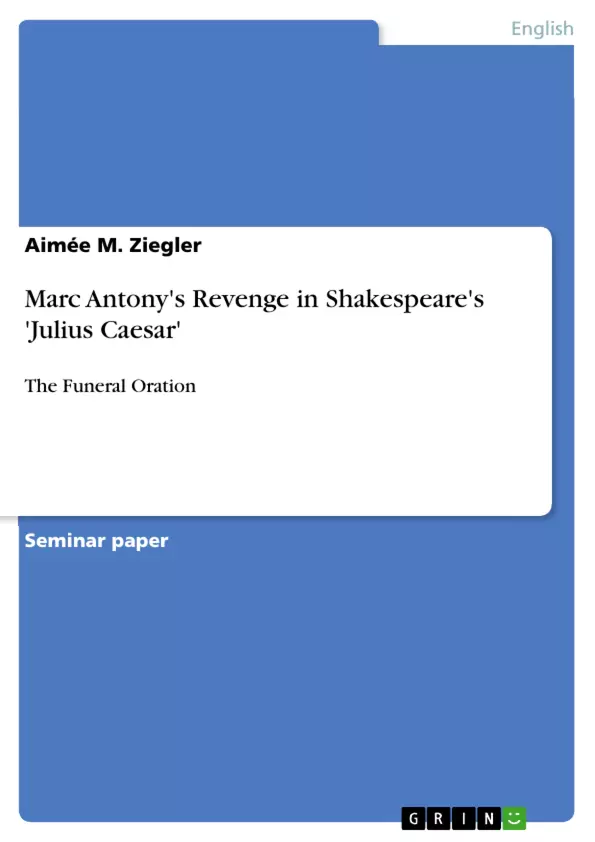This paper will show which rhetorical strategies Antony uses to convince the plebeians of his opinion, that Caesar was murdered and no tyrant and therefore should be avenged. After Brutus' speech the audience is sure that it was tyrannicide and that they should be happy, so Antony did not have an easy task in convincing them, especially because he could not plot the rebellion openly because then he would have broken his word not to blame the conspirators. (3.1.245) So he has to use several stylistic devices and pretend that the audience plots it all by themselves and to analyze how the mood in the public changes throughout his speech is fascinating to retrace.
Table of Contents
- 1. Introduction
- 2. The Funeral Oration
Objectives and Key Themes
This paper aims to analyze the rhetorical strategies employed by Mark Antony in Shakespeare's Julius Caesar to persuade the plebeians of his perspective on Caesar's assassination. It examines how Antony, despite being restricted from openly condemning the conspirators, effectively manipulates the audience's emotions and opinions through masterful use of stylistic devices.
- Antony's rhetorical strategies in his funeral oration
- The impact of irony and other stylistic devices on the plebeians
- The shift in public opinion from support of the conspirators to a desire for revenge
- The role of pathos and ethos in Antony's persuasive speech
- Analysis of Antony's manipulation of the audience's emotions and beliefs
Chapter Summaries
1. Introduction: This introductory chapter sets the stage for the analysis by establishing the context of Mark Antony's role in Shakespeare's Julius Caesar following Caesar's assassination. It highlights Antony's initial silence and subsequent importance, emphasizing his skill in oratory and his ability to manipulate his audience. The chapter introduces the central research question: how does Antony use rhetorical strategies to convince the plebeians that Caesar's murder was unjust and should be avenged, given the constraints imposed by his promise not to openly blame the conspirators? This sets the framework for a detailed examination of Antony's speech and its impact.
2. The Funeral Oration: This chapter delves into a detailed analysis of Antony's funeral oration, focusing on the various rhetorical devices he employs. It breaks down the speech's structure, highlighting the use of irony ("I come to bury Caesar, not to praise him") and the repeated assertion of Brutus's honorability to subtly undermine the conspirators' justification. The chapter explores how Antony's use of pathos (appealing to the emotions of the audience through displays of grief and carefully chosen words) and ethos (establishing his credibility and trustworthiness) effectively shifts the plebeians' perspective. The analysis includes examples of aposiopesis (artful pauses) and the effective use of Caesar's will to further manipulate the crowd's sentiments and incite them to revenge.
Keywords
Mark Antony, Julius Caesar, rhetoric, funeral oration, persuasion, irony, pathos, ethos, stylistic devices, plebeians, manipulation, revenge, Shakespeare.
Frequently Asked Questions: Analysis of Mark Antony's Funeral Oration in Shakespeare's Julius Caesar
What is the main focus of this academic paper?
This paper analyzes the rhetorical strategies employed by Mark Antony in Shakespeare's Julius Caesar to persuade the plebeians to shift their opinion on Caesar's assassination. It examines how Antony subtly manipulates the audience's emotions and opinions, despite restrictions on openly condemning the conspirators.
What are the key themes explored in the analysis?
The analysis explores Antony's rhetorical strategies, the impact of irony and other stylistic devices, the shift in public opinion, the roles of pathos and ethos in Antony's speech, and how he manipulates the audience's emotions and beliefs.
What is covered in the introduction chapter?
The introduction establishes the context of Mark Antony's role after Caesar's assassination, highlighting his initial silence and subsequent importance. It introduces the central research question: how does Antony use rhetoric to convince the plebeians that Caesar's murder was unjust, given constraints on openly blaming the conspirators?
What is the main focus of the chapter on the funeral oration?
This chapter provides a detailed analysis of Antony's funeral oration, focusing on rhetorical devices like irony ("I come to bury Caesar, not to praise him"), the subtle undermining of the conspirators' justification, and the use of pathos and ethos to shift the plebeians' perspective. It also examines examples of aposiopesis and the use of Caesar's will to manipulate the crowd.
What rhetorical devices are discussed in the analysis of Antony's speech?
The analysis examines several rhetorical devices including irony, pathos (appeal to emotion), ethos (establishing credibility), aposiopesis (artful pauses), and the strategic use of Caesar's will to sway the audience.
What is the overall objective of the analysis?
The paper aims to demonstrate how Antony, through masterful use of rhetorical strategies, successfully manipulates the plebeians into turning against the conspirators and desiring revenge, despite appearing to remain neutral.
What are the key words associated with this analysis?
Key words include Mark Antony, Julius Caesar, rhetoric, funeral oration, persuasion, irony, pathos, ethos, stylistic devices, plebeians, manipulation, revenge, and Shakespeare.
What is the structure of the provided preview?
The preview includes a table of contents, objectives and key themes, chapter summaries, and keywords, providing a comprehensive overview of the analysis.
- Quote paper
- Aimée M. Ziegler (Author), 2010, Marc Antony's Revenge in Shakespeare's 'Julius Caesar', Munich, GRIN Verlag, https://www.grin.com/document/182864



